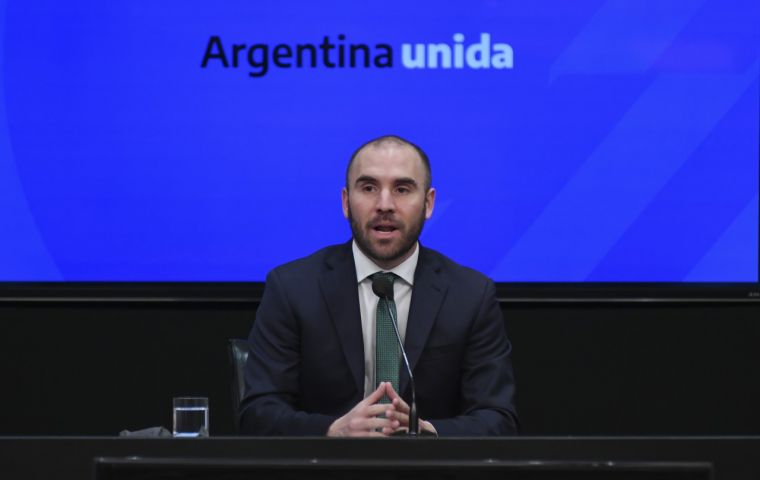MercoPress. South Atlantic News Agency
Mass resignation in Argentina's Government after electoral loss
 CFK reportedly told Economy Minister Guzmán she was not after him
CFK reportedly told Economy Minister Guzmán she was not after him Last Sunday's defeat at the Open, Simultaneous and Mandatory Primary (PASO) elections finally seem to have taken its toll on Argentina's Frente de Todos (FdT) ruling coalition as members of cabinet loyal to Vice President Cristina Fernández de Kirchner handed in their resignations to President Alberto Fernández, it was reported.
Die-hard Kirchnerites are thus seeking to have the head of state take the fall for an unprecedented and disappointing result. CFK's political dauphin, Axel Kicillof, Governor of the Province of Buenos Aires and former Economy Minister under her, has called for a larger financial deficit with which to fund social welfare disbursements to alleviate the burden on a population hit by the coronavirus pandemic restrictions.
On the other hand, current Economy Minister Martín Guzmán, who responds to Alberto Fernández, was trying to balance the budget to the best of his abilities but the negative consequences have failed to go unnoticed.
In the end, the problem lies with the President celebrating the First Lady's birthday while he himself had mandated the entire population to stay locked down. Hence, Alberto's popular support is at its lowest and quite unlikely to recover in time for the November 14 mid-term elections, which will probably leave the FdT without a majority on the Senate.
The current administration has reportedly issued a large number of unbacked pesos, which should sooner or later show up in the form of high inflation or a currency devaluation... Or both... While an old Roger Whittaker song seems to be playing in the background: They say when you gain a lover / You begin to lose a friend / That the end of the beginning's / The beginning of the end / They say the moment that you're born / Is when you start to die / And the first time that we said hello / Began our last goodbye.
The atmosphere Wednesday at the Casa Rosada was hard to describe since in fact most of the resignations were announced on TV but not formally submitted to the Office of the Cabinet Chief, where only two of them had actually been received, according to reports.
In this scenario and for the time being, the President seems to be prone to making no changes, particularly regarding Guzmán, whom CFK is said to have phoned personally to say it was not him she was after. According to press reports, the ones the former President does want to be removed are Cabinet Chief Santiago Cafiero and Production Development Minister Matías Kulfas, although other media coverages had singled out Guzmán as one of the ministers targeted.
Therefore, it remains to be seen what with happen with the announced massive resignations of Eduardo De Pedro (Interior), Martín Soria (Justice), Roberto Salvarezza (Science), Tristán Bauer (Culture), Juan Cabandié (Environment) and other officials such as Luana Volnovich and Fernanda Raverta, Pablo Ceriani, and Martín Sabbatella.
In addition to those who respond to either of the Fernándezes, there is a third bloc within the governing alliance: the one led by House of Deputies' Speaker Sergio Massa.
On Wall Street, Argentine stocks lost up to 9%, with the greatest impact on the energy sector and banks, after remarkable surges in previous weeks. Political instability does have an impact on markets and the US dollar may skyrocket, according to financial experts.
In the province of Buenos Aires, all cabinet members have
submitted their resignations to Kicillof, who -like Alberto Fernández- may or may not accept them.
Meanwhile, the arrival of foreign investments seems to have been put on hold after The Financial Times published an article reminding its readers that “Argentina is Known for Disappointing Investors.”
“The poor result of Alberto Fernández's left-wing Peronist party does not necessarily announce a better economic policy or a victory for the opposition in the 2023 presidential elections,” the article signed by Michael Stott said. Stott also warned that the electoral catastrophe suffered by the ruling party could derive “in the short term, in a shift towards more populist policies,” but “with Argentina still out of international debt markets and a struggling economy, the room for further increases in public spending is limited.”




Top Comments
Disclaimer & comment rules-

Read all comments‘trying to balance the budget’
Sep 16th, 2021 - 10:47 pm 0Good luck with that.
Commenting for this story is now closed.
If you have a Facebook account, become a fan and comment on our Facebook Page!